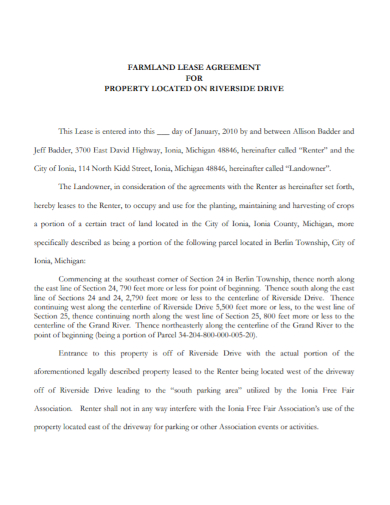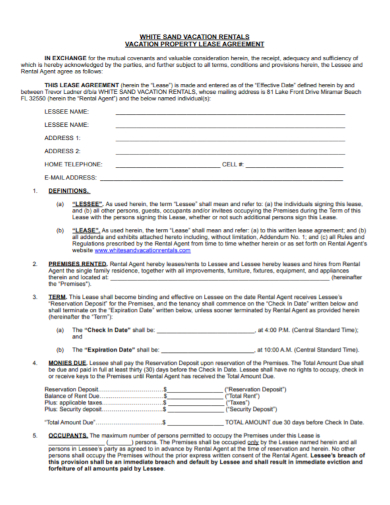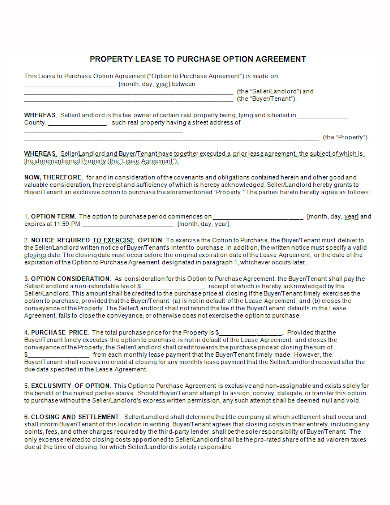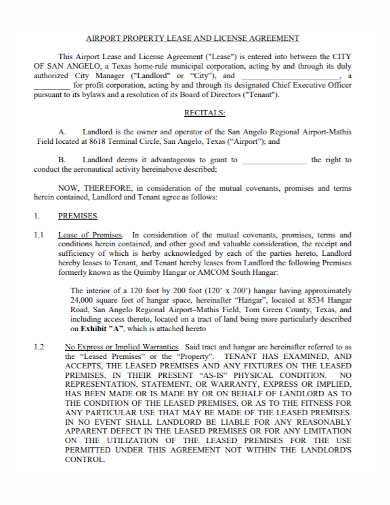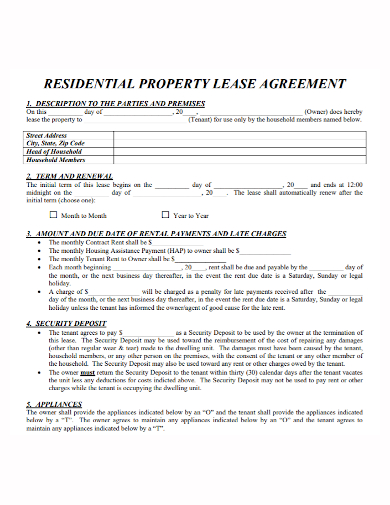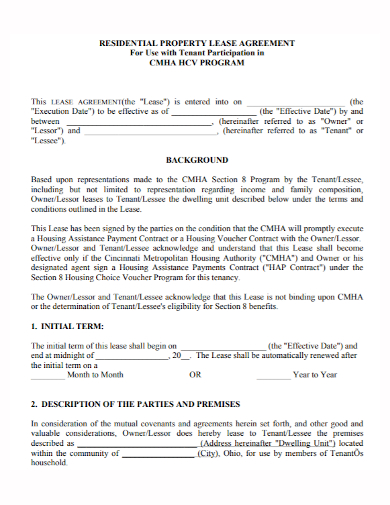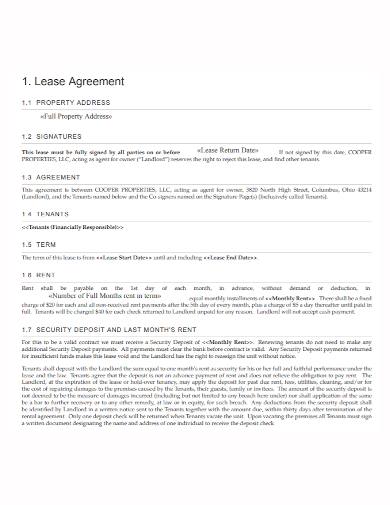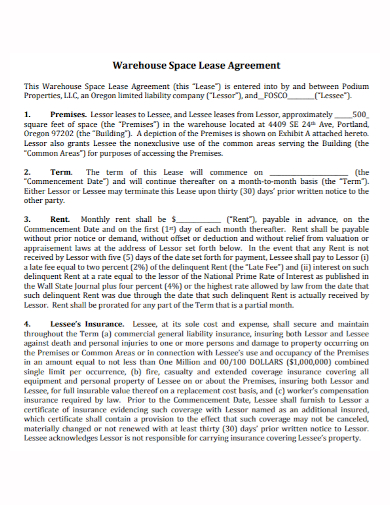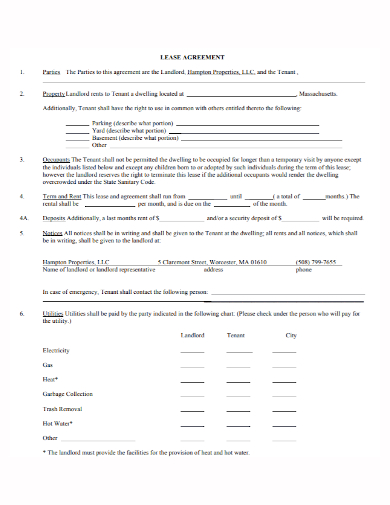A rental and lease agreement is a contract between a real estate owner, referred to as the “landlord” or “lessor,” and someone else referred to as the “tenant” or “lessee,” who agrees to pay rent while occupying the property. It’s an agreement that allows you to rent a space (commercial or residential) for a specific amount of time. The terms of the contract are negotiable between the tenant and the landlord, and the document is legally and mutually binding once signed.
10+ Property Lease Agreement Samples
A lease agreement is a legally binding contract between a landlord and a tenant that spells out the terms under which the tenant can rent property from the landlord, such as the lease’s duration, monthly rent amount, and maintenance responsibilities.
1. Property Lease Agreement Template
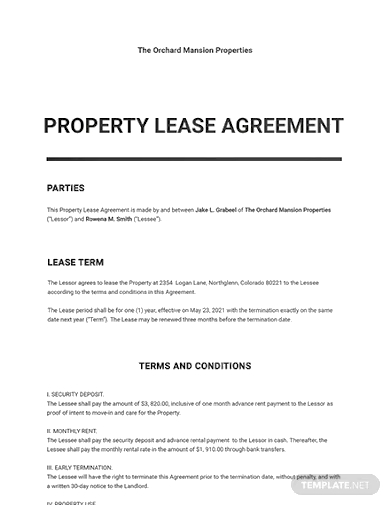
2. Rental Property Lease Agreement Template
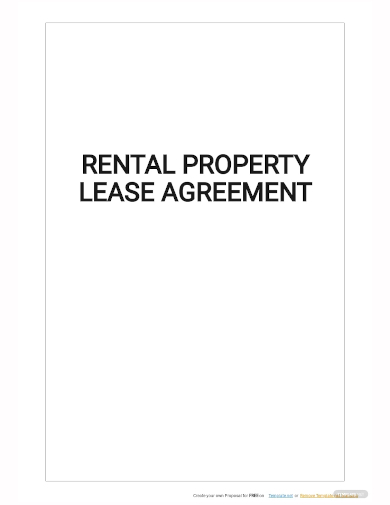
3. Farm Property Land Lease Agreement
4. Vacation Rental Property Lease Agreement
5. Option to Property Lease Agreement
6. Property Lease License Agreement
7. Residential Property Lease Agreement
8. Property Lease Program Agreement
9. Sample Property Lease Agreement
10. Warehouse Property Lease Agreement
11. Standard Property Lease Agreement
Difference Between a Rental and Lease Agreement
In the case of real estate or apartments, a rental agreement usually specifies a short-term tenancy, typically 30 days. The lease is automatically renewed unless the renter or landlord provides a move-out notice. The agreement’s terms can also be changed every month. A lease gives the tenant the right to live in the property for a set period of time, usually six months to a year or longer. The landlord cannot change the terms of the lease unless the tenant agrees. In most cases, a lease does not automatically renew. A tenant who stays at the property for an extended period of time becomes month-to-month until a new rental or lease agreement is signed.
Leasing Process
- Your rental property should be advertised. Begin by writing a rental ad that highlights your home’s best features, and then include at least 10 high-resolution photos of the interior and exterior.
- Organizing a public open house or a private showing. Allow prospective tenants to inspect the property to ensure that it meets their requirements.
- All rental applications are being reviewed. Applications provide information about a potential tenant’s rental history, assisting you in finding a dependable tenant for your property.
- The tenant’s credit is being checked. If local law allows, the tenant-screening process includes information on the applicant’s employment status, current, and previous residences, as well as a look into their financial and criminal history.
- Obtaining references from previous landlords. Contact current or former landlords by phone or email to confirm whether the applicant paid rent on time, took good care of the property, and would rent to them again.
Every state has landlord-tenant laws that can help you manage your rental property by regulating rent-related issues, lease renewals, addenda, and notices. These laws define your rights and responsibilities as a landlord, as well as the rights and responsibilities of tenants. The requirements of landlord-tenant laws vary by state, so speak with a local attorney to learn more about how your state’s landlord-tenant laws may affect your lease.
FAQs
Who needs a residential lease agreement?
Anyone leasing a property should have a residential lease agreement in place that spells out the terms of the agreement and ensures that all parties involved are legally protected. Property managers looking for tenants and tenants looking for property, social service providers looking for supportive housing, real estate agents, and anyone renting or looking to rent a property are all examples of these people.
Can I write my own lease agreement?
Yes, you certainly can. A lease is a contract between the landlord and the tenant. The standard items in a lease are the amount of rent, the length of the lease, who is responsible for different maintenance items, and the penalties that can be assessed if the terms are not followed.
Does a lease needs to be notarized?
A lease is a legally binding agreement between a landlord and a tenant. It is usually not necessary to have it notarized.
If you want to see more samples and formats, check out some property lease agreement samples and templates provided in the article for your reference.
Related Posts
FREE 10+ Mentoring Agreement Samples In MS Word | Apple Pages | PDF
FREE 10+ Partner Agreement Samples In MS Word | Google Docs | Apple Pages | PDF
FREE 10+ Individual Agreement Samples In MS Word | Google Docs | Apple Pages | PDF
FREE 10+ Strategic Agreement Samples In MS Word | Google Docs | Apple Pages | PDF
FREE 10+ Equity Agreement Samples In MS Word | Google Docs | Apple Pages | PDF
FREE 10+ Producer Agreement Samples in MS Word | Apple Pages | PDF
FREE 10+ Grant Agreement Samples In MS Word | Apple Pages | PDF
FREE 8+ Meeting Agreement Samples in MS Word | Google Docs | Apple Pages | PDF
FREE 10+ Community Agreement Samples In MS Word | Google Docs | PDF
FREE 8+ Real Estate Option Agreement Samples in MS Word | PDF
FREE 10+ Call Option Agreement Samples In MS Word | PDF
FREE 10+ Advertising Agreement Samples In MS Word | Google Docs | Apple Pages | PDF
FREE 10+ Car Agreement Samples In MS Word | Google Docs | Apple Pages | PDF
FREE 10+ Horse Agreement Samples In MS Word | Apple Pages | PDF
FREE 10+ Option Agreement Samples In MS Word | Google Docs | Apple Pages | PDF

